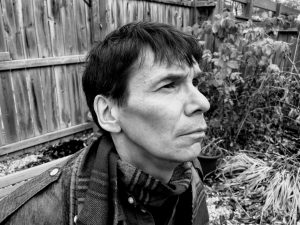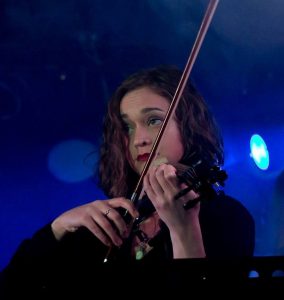
Andrew Balfour
Looking back on the first few months of the pandemic, Andrew Balfour recalls being in “an absolute state of shock.” The composer and artistic director of Winnipeg-based chamber choir Dead of Winter recalls, “After I’d realized the seriousness of [COVID-19] globally, I was even starting to think, ‘I had a good run. I was lucky enough to do what I wanted for this long. Maybe I’ll have to get another job.’”
Balfour, like other composers in the field of contemporary classical music, was for a time completely derailed by the constant postponement and cancellation of live performances. Most often, composing is a matter of devising a score and then handing it off. So while other music creators were able to live-stream from home, or make recordings, or collaborate remotely with other songwriters or bandmates, or continue to produce soundtrack work, composers were left working solo, on music no one would be able to hear – including themselves – for an indefinite period of time.
In theory, it would be ideal to work with few distractions and no engagements. In practice, this was rarely the case. For Corie Rose Soumah, a SOCAN Foundation Award-winning young composer from Montréal, who’s studying for a Doctor of Musical Arts (DMA) degree at Columbia University in New York, the pandemic’s psychological toll meant “the question of productivity was an irritation: ‘I can’t see my family, I can’t see my friends, I’m staying in this apartment with a cat – and then I have to compose?’”
“The question of productivity was an irritation” – Corie Rose Soumah

Corie Rose Soumah
Composers were also cut off from workshopping their pieces with performers – which is especially a problem when you’re writing adventurous music that explores extended instrumental techniques. New Brunswick-born, Ottawa-based Sophie Dupuis, President of the Canadian League of Composers, says that during lockdown, she “missed being able to go to a friend’s house and be, like, ‘Hey, I don’t know much about the trumpet. Can you try a few things for me?’ It’s a challenge to find a substitute for this kind of connection.”
Changes in living conditions can affect a composer’s style. Soumah had long been inspired by the stillness that could be found in the downtime of everyday life in cities – as heard in her sparse, enigmatic 2019 work for bass clarinet and percussion, Trois situations urbaines. But during lockdown, she says, even as public spaces became physically emptier, they “became anxiety-filled. Subways, grocery stores, and public spaces in general didn’t have the same ‘nothingness’ to them – so I’m moving forward to more ‘filled’ music, rather than [sounds] interacting with silence.”
Once the initial shock of the pandemic subsided, many composers took the opportunity to re-think their approach, both to specific pieces and in general. Balfour, who is Cree, had – along with fellow Indigenous composers Eliot Britton and Cris Dirksen – already written pieces for a performance called Captive, originally intended for Dead of Winter’s Truth and Reconciliation series in May of 2020. When the concert was pushed back (it’s now scheduled for May of 2022), the composers were given the option to re-work their music. Says Balfour, “We thought it would be more powerful; we were all ‘captive’ at the time, in lockdown. I wrote an entirely different piece. I think that’s happened quite a bit in the composing world. People have more time to approach things rather than being rushed.”
“Extended deadlines were a relief” – Sophie Dupuis

Sophie Dupuis
For Dupuis, “Extended deadlines were a relief. They gave me the chance to achieve something I actually wanted to create. After that first year, things started to feel familiar, and the vaccine was starting to be distributed widely, which relieved some of the initial stress, and gave space to imagination and planning.”
Over time, outside-the-box thinking led to online performances, often pre-recorded and featuring the smaller ensembles for which contemporary classical composers predominantly write. In October of 2021, Dupuis was able to sit in remotely on a rehearsal of her new piece, Wingless Birds Can Fly Too, before it was premiered online by a quartet of flute, saxophone, piano, and percussion, distanced and separated by plexiglass, at the Canadian Music Centre in Toronto. The concert, presented by the Association of Canadian Women Composers, was called Building Up. Says Dupuis, “my piece is about a journey to building ourselves up as individuals, with a lot of setbacks along the way that make us stronger.”
Dupuis points to how the period of reflection imposed by the pandemic “has been intensified by the nationwide awakening to under-served and under-represented populations, and voices that were finally amplified.” Indeed, the widespread connections fostered by online platforms during the pandemic led to important conversations about social issues, and about how to reach a more diverse, younger audience. Across Canada, says Balfour, choirs were talking not only about how to stop their performances from becoming super-spreader events (special “singing masks” can help), but also about “de-colonizing the repertoire and organizations.” The name “Dead of Winter” itself emerged from these conversations, replacing the ensemble’s original “Eurocentric, classical” name, Camerata Nova.
Balfour has noticed that in the choral world, non-Indigenous choral directors are now more likely to approach Indigenous composers’ music with “the proper renumeration, the proper protocol, the proper way to approach First Nations languages. That’s very encouraging, because with the discovery of the young ones’ bodies at residential schools, this has been a devastating time. It means a lot to the Indigenous community to be finally heard.”
“It means a lot to the Indigenous community to be finally heard” – Andrew Balfour
Soumah now finds herself busy with commissions, and while she’s excited, she’s also wary of tokenism. She says, “Just thinking about the Black Lives Matter movement, the classical sphere is like, ‘Well, it’s not really a problem for us. We’ll just perform one piece from a BIPOC composer and move on.’ I think [change] has to move in structures.” Classical ensembles and organizations, she says, “have the chance to take a stance and move forward. Some of them are, but I just wish it was faster, because we really need it.”
As in-person performances slowly return, some classical organizations will inevitably be looking to put bums in seats by programming beloved, “safe” popular classics. And yet, Balfour has noticed “new music being commissioned across the board – whether it’s community choirs, professional choirs, [or] high school/collegiate choirs, I’m seeing a new commitment to new Canadian music.” Imaginative performances are on the rise as well. Soumah looks forward to participating in Montréal’s 2022 Festival Unisson, in which performers will play her solo works for their instruments, in front of one audience member each. “The concept is about intimacy, and hearing the instruments in very close proximity,” she says. The concerts will emphasize the kind of physical connection that lockdowns cut off. “I think it’s a beautiful project.”
Among Dupuis’ commissions are a work for the B.C.-based Naden Navy Band about the experiences of military sexual trauma (MST) survivors, and another for a cross-cultural project by Toronto’s PhoeNX Ensemble that involves Canadian and Chinese composers. “Things like boldness, individuality, and fairness expressed in art really inspire me,” she says. “My values are more apparent in the type of work that I’m doing now.” The reflection imposed by the pandemic has allowed her to work in what she calls “a more peaceful and grounded way.”
Says Balfour, “I’m lucky enough to come out of this feeling a bit more confident in my writing. Most people I know are expressing this idea of not taking things for granted. Whenever you come through an unprecedented time, there’s always a shift in collective thinking. The closest example is the trauma in the collective memory in the aftermath of World Wars I and II. I don’t think we went through anything quite as drastic, but billions are still affected. It will be interesting to see what comes out of this, artistically. It’s kind of an exciting time.”